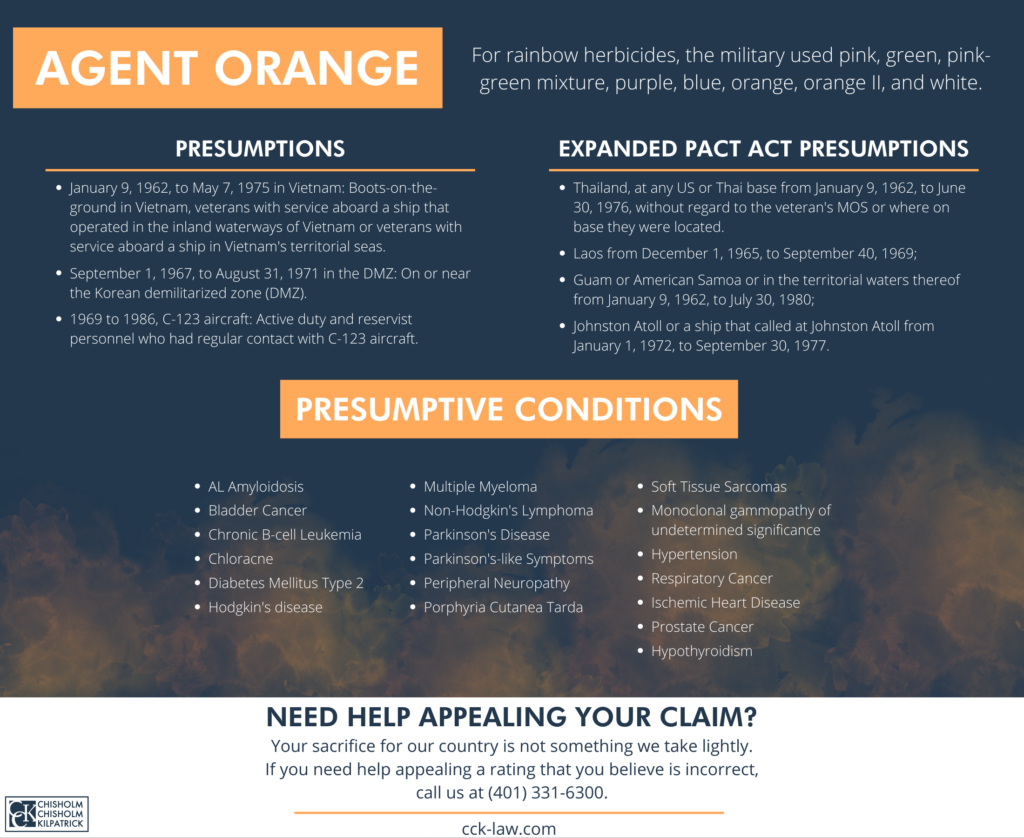Getting Veterans (VA) Disability for Agent Orange Diseases

CCK Law: Our Vital Role in Veterans Law
Agent Orange is a toxic substance that thousands of veterans were exposed to over the course of their military service. As a result, many of these veterans went on to develop significant health issues, including Parkinson’s disease and even cancer.
If you were exposed to Agent Orange during your U.S. military service, you may be eligible for VA service-connected disability compensation for medical conditions associated with Agent Orange.
If you developed cancer or another health condition after being exposed to Agent Orange, get an experienced veterans’ advocate on your team to help you get the benefits you deserve. Contact the attorneys at Chisholm Chisholm & Kilpatrick LTD for a free case evaluation. Call today at 800-544-9144.
What is Agent Orange?
Agent Orange is a powerful herbicide. The U.S. military used it to defoliate swaths of land in Thailand, Vietnam, and Korea. It was also tested, used, and stored at various other locations. Unfortunately, research later showed the herbicide was highly toxic to anyone who came in proximity to it.
The effects of Agent Orange can take years to appear. Even if many decades passed between your exposure in military service and medical diagnosis of an associated condition, it is not too late to file a claim. If you can prove you were exposed to Agent Orange during service and have an associated medical condition, VA must grant service connection.
What Are Presumptive Conditions and Benefits?
As a result of the Agent Orange Act of 1991, VA recognizes certain conditions as being related to Agent Orange exposure. These conditions, or diseases, are classified as presumptive. Essentially, this means that if you are diagnosed with one of these conditions and can indicate that you were exposed to Agent Orange during your service, VA will presume that your condition is service connected.
While Agent Orange was widely used during the Vietnam War era, VA requires veterans to have served in specific locations at specific time periods to be eligible for presumptive service connection. Recently, the Honoring Our Promise to Address Comprehensive Toxics Act (PACT Act) of 2021 expanded Agent Orange presumptions to include additional locations and time periods.

To qualify for presumption of exposure, veterans must have had active military, naval, air, or space service in the following locations and time periods:
- The Republic of Vietnam from January 9, 1962 to May 7, 1975 (including Brown Water and Blue Water Navy veterans);
- Thailand, at any US or Thai base from January 9, 1962 to June 30 1976, without regard to the Veteran’s MOS or where on base they were located;
- Laos from December 1, 1965 to September 30, 1969;
- Cambodia, specifically at Mimot or Krek, Kampong Cham Province from April 16, 1969 to April 30, 1969;
- Guam or American Samoa or in the territorial waters thereof from January 9, 1962 to July 30, 1980;
- Johnson Atoll or a ship that called at Johnston Atoll from January 1, 1972 to September 30, 1977;
- On or near the Korean demilitarized zone (DMZ) between September 1, 1967 and August 31, 1971; and
- Active duty and reservist personnel who had regular contact with C-123 aircraft between 1969 and 1986.
If the veteran is eligible for presumptive service connection, the process for receiving VA disability compensation benefits and healthcare should be considerably easier, as the burden is not on the veteran to prove Agent Orange caused their condition.
What Agent Orange-Related Conditions Qualify for Disability Benefits?
Medical researchers have linked Agent Orange to a host of health conditions. VA adds new conditions to the list periodically. No matter your diagnosis, contact us for a free consultation. Currently, the list of health conditions associated with Agent Orange exposure includes the following:
The 2021 NDAA, or National Defense Authorization Act, passed by Congress added bladder cancer, Parkinson’s-like Symptoms, and Hypothyroidism to the list of presumptive conditions caused by Agent Orange exposure.
Essentially, Congress bypassed VA to add these conditions to the presumptive conditions list and, by statute, determined that there is a link between Agent Orange exposure and bladder cancer, Parkinson’s-like symptoms, and hypothyroidism. With this, Congress has demonstrated that it has the power to use the NDAA to add conditions to the presumptive list. This could potentially lead to more conditions being added to the list in the future.
Additionally, in July 2022, the PACT Act added hypertension and monoclonal gammopathy of undetermined significance (abnormal protein in the blood) to VA’s presumptive Agent Orange list.
How Do I Get Disability for Agent Orange Exposure?
The most important part of our job as your VA disability attorneys is establishing that exposure to Agent Orange caused your medical condition. To build a compelling case, our team at Chisholm Chisholm & Kilpatrick LTD will prove the following:
You were exposed to Agent Orange during your service in the U.S. military.
We can do this in a few ways. If your military records show you served in a qualifying location during the Vietnam era, VA will grant service connection on a presumptive basis. This means that VA assumes that you were exposed to Agent Orange while serving in these areas during the Vietnam War.
However, even if VA does not presume a connection to service, we can help you recover benefits if you served somewhere else. The right combination of evidence, medical and service records, lay testimony, and legal argument could win your case.
You later received a medical diagnosis of cancer or another qualifying illness.
You must have a diagnosed medical condition to be eligible for VA disability benefits. If doctors diagnosed you with any of the medical conditions on the list above, we will gather the documentation from your doctor or medical professional that we need to submit to VA.
Your illness resulted from your exposure to Agent Orange.
The last, and perhaps most important step in the process is connecting your diagnosis to Agent Orange. If your health condition is not on the list or you did not serve in a qualifying location, we will have to do some research to establish a link, but our attorneys are qualified to do so.
We can interview medical doctors and experts, examine scientific studies, and perform other steps to build the strongest case that Agent Orange caused your condition.

Agent Orange Exposure Beyond the Veteran
Agent Orange exposure does not end with the veteran, but rather Agent Orange exposure may also contribute to birth defects in veterans’ children. Studies have indicated that Agent Orange exposure has led to increased rates of stillbirths and birth defects in the children of veterans who were exposed to Agent Orange.
Birth defects and conditions such as spina bifida, cleft lip, congenital heart disease, hip dysplasia, Hallerman-Streiff syndrome, neural tube defects, Poland syndrome, and others may also be caused by Agent Orange exposure in children. Children who were exposed may be eligible for benefits. In order to qualify, the children must be:
- The biological child of a woman Vietnam Veteran who served between February 28, 1961, and May 7, 1945
- Conceived after the date on which the Veteran first entered the Republic of Vietnam
How Much Will My Monthly VA Disability Benefit Be?
Depending on the severity of your disability, you can receive as much as $3,831.30 per month as a single person. If you have dependents, such as a spouse, children, or dependent parents, you can earn even more money on their behalf.
VA uses a disability rating system to assign benefits. Based on the severity of your condition, it assigns you a rating of 0 to 100 percent. The higher your disability rating, the more money you receive in benefits each month.
As of 2026, the VA disability rate benefit amounts are as follows:
- 0 percent disability rating: $0.00 per month
- 10 percent disability rating: $180.42 per month
- 20 percent disability rating: $356.66 per month
- 30 percent disability rating: $552.47 per month
- 40 percent disability rating: $795.84 per month
- 50 percent disability rating: $1,132.90 per month
- 60 percent disability rating: $1,435.02 per month
- 70 percent disability rating: $1,808.45 per month
- 80 percent disability rating: $2,102.15 per month
- 90 percent disability rating: $2,362.30 per month
- 100 percent disability rating: $3,938.58 per month
If your diagnosis is active cancer, VA assigns an automatic disability rating of 100 percent. This qualifies you for the max benefit of $3,831.30 per month (plus anything you receive on behalf of dependents). Your 100 percent rating continues until six months after successful completion of a treatment program. At that time, VA requires you to undergo another evaluation to determine the current status of your diagnosis. It then re-rates you based on the result.
Additional Benefits and Care for Veterans Who Were Exposed to Agent Orange
Veterans who were exposed to Agent Orange may also be eligible to receive an Agent Orange Registry Health Exam. This exam is free of charge. The purpose is to “alert Veterans to possible long-term health problems that may be related to Agent Orange exposure during their military service.”
Importantly, the exam is not a Compensation & Pension (C&P) exam. The exam is also not required to receive VA benefits. The exam is based on the veteran’s recollection of service, not their military service records.
VA notes that these exams can “help [VA] understand and respond to these health problems more effectively.” Through the program, veterans may receive free lab tests and referrals to medical specialists for their conditions related to Agent Orange exposure.
Secondary Conditions Related to Agent Orange Exposure
It is important to note that if further disease or disability results from one of the presumptive conditions associated with Agent Orange exposure, you can file a claim for secondary service connection. For VA to grant secondary service connection, veterans must demonstrate the following:
- A diagnosis for the secondary disability; and
- Medical evidence showing the relationship between the service-connected disability and the secondary disability.
Examples of common secondary conditions related to Agent Orange exposure, including peripheral neuropathy as secondary to diabetes mellitus type II and depression as secondary to cancer.
Call Chisholm Chisholm & Kilpatrick LTD Today
VA frequently gets backlogged with claims and appeals. As a result, the process can take some time. The sooner you get started, the sooner you can start to receive benefits. Our attorneys are ready to start building your case.
If you think you were exposed to Agent Orange during your military service and now have a qualifying medical condition or diagnosis you believe to be caused by exposure, do not miss out on the benefits you deserve. The veterans advocates at Chisholm Chisholm & Kilpatrick LTD will fight your case aggressively. Call today for a free case evaluationat 800-544-9144.
Share this Post